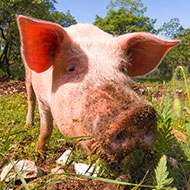
New funding to be used in redevelopment of specialist facility
The Animal and Plant Health Agency (APHA) has received a £1.4 million investment boost in order to bolster its work in combating current and emerging animal and plant diseases.
The new funding was announced in the Budget on Wednesday 11 March and will be used to redevelop the current Weybridge facility, which houses specialist research and laboratory facilities and capabilities for animal health science and disease control.
The Weybridge facility also advises a number of organisations including the United Nations Food and Agriculture Organisation (FAO), the World Organisation for Animal Health (OIE) and the World Health Organisation (WHO), as the international reference laboratory for a large range of animal diseases.
The UK currently export £4.2bn of livestock, meat and meat products, dairy and animal by-products per year. This investment will help the APHA to continue to safeguard these exports and will improve opportunities for global trade by enhancing the UK’s reputation as a safe trading partner.
Chris Hadkiss, chief executive of APHA said: “This is fantastic news for everyone at APHA and the wider Defra group as this gives the financial investment to ensure we can continue to enhance our crucial and valuable role in animal health science and in providing our emergency response to disease outbreaks.
“The financial commitment also highlights how the government recognises our international reputation as experts in animal and plant health science and the critical role we have in protecting the UK and the economy from animal disease risk.”



 The latest
The latest